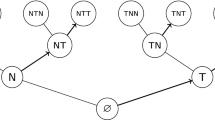Abstract
A learner is engaged in “confident learning” when we are guaranteed that the hypotheses put out by the learner will converge in the limit. Whence the word “confidence”? We are confident that the learner will eventually learn. The question raised in the paper is: what does the learner really learn? Friend applies the Putnam permutation argument to the scenario of confident learning to undermine our confidence.
It is true that the learner learns an equivalent algorithm to that put out by the informant. However, it only has to be equivalent in some respects, in order to converge. That is, the algorithm does not have to be identical to the algorithm put out by the informant. As a result, the learning is somewhat superficial. Our confidence can only be placed at a superficial level of learning, which might be alright for some purposes, but not for others.
Preview
Unable to display preview. Download preview PDF.
Similar content being viewed by others
References
Clark, P. and Hale, B. (eds.) (1994). Reading Putnam, Oxford: Basil Blackwell.
Glymour, C., Kelly, K. and Juhl, C. (1994). “Reliability, Realism, and Relativism”, in Clark, P. and Hale, B. [1], 98–160.
Gold, E.M. (1967). “Language Identification in the Limit”, Information and Control 10, 447–474.
Hallett, M. (1994). “Putnam and the Skolem Paradox”, in Clark, P. and Hale, B. [1], 66–97.
Machover, M. (1996). Set Theory, Logic and their Limitations, Cambridge: Cambridge University Press.
Prawitz, D. (1965). Natural Deduction: A Proof-Theoretical Study, Stockholm: Almqvist and Wiksell.
Prawitz, D. (1974). “On the Idea of a General Proof Theory”, Synthese 27, 63–77.
Putnam, H. (1975). “‘Degree of Confirmation’ and Inductive Logic”, Mathematics, Matter, and Method, Cambridge: Cambridge University Press, 270–292.
Putnam, H. (1981). “A Problem About Reference” and “Appendix”, in Reason, Truth and History, Cambridge: Cambridge University Press, 22–48, 217–218.
Quine, W.V.O. (1960). Word and Object, Cambridge (Mass.): MIT Press.
Author information
Authors and Affiliations
Editor information
Editors and Affiliations
Rights and permissions
Copyright information
© 2007 Springer
About this chapter
Cite this chapter
Friend, M. (2007). Some Philosophical Concerns about the Confidence in ‘Confident Learning’. In: Friend, M., Goethe, N.B., Harizanov, V.S. (eds) Induction, Algorithmic Learning Theory, and Philosophy. Logic, Epistemology, and the Unity of Science, vol 9. Springer, Dordrecht. https://doi.org/10.1007/978-1-4020-6127-1_7
Download citation
DOI: https://doi.org/10.1007/978-1-4020-6127-1_7
Publisher Name: Springer, Dordrecht
Print ISBN: 978-1-4020-6126-4
Online ISBN: 978-1-4020-6127-1
eBook Packages: Humanities, Social Sciences and LawPhilosophy and Religion (R0)




